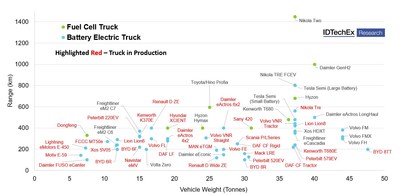
BOSTON, July 20, 2022 /PRNewswire/ — The vast majority of new trucks sold today are powered by diesel engines, but like other on-road vehicle segments, this is set to change. The scale of greenhouse gas emissions reductions required to meet national targets effectively demands complete decarbonization of the truck market over the next 30 years. This will only be achieved with the widespread deployment of zero-emission powertrains. Major truck manufacturers and automotive suppliers now understand this; the fight for future market share is already underway.
The new IDTechEx report, “Electric and Fuel Cell Trucks 2023-2043“, explores the future of the rapidly developing zero-emission truck market, covering battery electric, plug-in hybrid, and hydrogen fuel cell trucks. The report discusses the technical and economic aspects of zero-emission truck deployment, key enabling technologies, and presents IDTechEx’s granular 20-year outlook for the zero-emission truck market, with a focus on the key regions, Europe, the U.S., and China.
Zero-Emission Truck Sales to see Rapid Growth
Despite increasing interest in zero-emission trucks, and substantial recent progress, the global market share of zero-emission trucks in 2021 was only 0.4% of total sales, approximately 13,000 units, with the vast majority in China.
The limited sales penetration in Western markets reflects a lack of available zero-emission trucks rather than a lack of demand. Major corporations are clamoring for low-emission trucks (and greater support from governments) to help them meet their corporate pledges to reduce their greenhouse gas emissions in line with the UNFCC Paris Agreement and national net zero-emission targets. In recognition of this demand, most major OEMs have launched or are about to launch a zero-emission truck into series production. With vehicles now becoming available and production scaling up, IDTechEx expects the global market to grow rapidly at a CAGR of 37.1% over the next decade.
Electric Trucks Already Deliver Useful Range
The key to zero-emission truck deployment is understanding daily duty cycle energy demand. It is frequently suggested that electric trucks cannot deliver useful range, because the weight and volume of today’s Li-ion batteries limit the energy that can be stored on board a BEV truck. Indeed, the chart highlights that the early generations of BEV trucks are limited to less than 400km on one charge (in optimal conditions). However, whilst long-haul applications are not yet feasible, a large percentage of urban and regional routes are deliverable with battery electric trucks. The U.S. Department of Transportation suggests that 50.5% of U.S. freight moves less than 100 miles per day, there is, therefore, a significant share of truck operations that are ripe for electrification. Longer range duty cycles will become possible in the future with improving battery pack energy density, better brake energy recuperation, and charging strategy optimization during breaks in operation.
A Niche for Fuel Cell Trucks
For BEV trucks to deliver longer-range applications, they will need a large battery capacity, but as such, will require considerable time to charge once depleted, this could hinder the flexibility vital to some freight operations. Fuel cell systems, which generate electricity from pressurized hydrogen stored on-board the truck, offer the possibility of zero-emission long-haul transportation without the need for unfeasibly large batteries and with the ability to refuel in a similar time window to diesel. The lack of hydrogen refueling infrastructure is a hindrance to FCEV rollout, however, several countries including Japan, Korea, Germany, and China are supporting initiatives to build hydrogen refueling stations, which could see FCEV become increasingly operable. A major challenge will also be producing low-carbon hydrogen at a cost that enables it to be a commercially viable ‘green’ automotive fuel. Today hydrogen is primarily produced from natural gas and has a large carbon footprint.
The new IDTechEx report, “Electric and Fuel Cell Trucks 2023-2043“, is designed to help businesses across the automotive industry plan for the future in this dynamic market. The report provides 80 forecast lines, giving a twenty-year outlook for zero-emission truck sales, market penetration, battery demand, fuel cell demand, and market value, with separate forecasts for medium and heavy-duty trucks.
To find out more about this report, please visit www.IDTechEx.com/ETruck. This report is part of IDTechEx’s broader mobility research portfolio, tracking the adoption of electric vehicles, battery and technology trends across land, sea, and air. Find out more at www.IDTechEx.com/Research/EV.
About IDTechEx
IDTechEx guides your strategic business decisions through its Research, Subscription and Consultancy products, helping you profit from emerging technologies. For more information, contact research@IDTechEx.com or visit www.IDTechEx.com.
Images download:
https://www.dropbox.com/sh/z80o0vxe4qzpgyb/AABfTBTQldBci6oxaILIRYI8a?dl=0
Media Contact:
Natalie Fifield
Digital Marketing Manager
press@IDTechEx.com
+44(0)1223 812300
Social Media Links:
Twitter: www.twitter.com/IDTechEx
LinkedIn: www.linkedin.com/company/IDTechEx
Facebook: www.facebook.com/IDTechExResearch
Photo: https://mma.prnewswire.com/media/1863085/IDTechEx_Trucks.jpg
Logo: https://mma.prnewswire.com/media/478371/IDTechEx_Logo.jpg
View original content to download multimedia:https://www.prnewswire.com/news-releases/the-zero-emission-truck-market-is-primed-for-growth-says-idtechex-301590185.html
SOURCE IDTechEx
Source link
The content is by PR Newswire. Headlines of Today Media is not responsible for the content provided or any links related to this content. Headlines of Today Media is not responsible for the correctness, topicality or the quality of the content.



